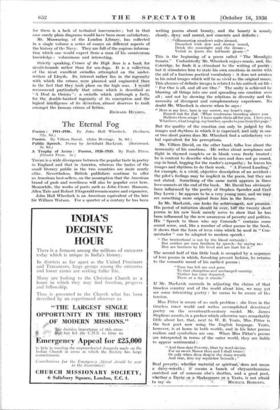The Eternal Fog
Poems: 1911-1936. By John Hall Wheelock. (Scribner. fl2s. 6d.)
'Poems. By Villiers David. (John Heritage. 3s. 6d.)
Public Speech. Poems by Archibald MacLeish. (Boriswood. 3s. 6d.) A Trophy of Arms : Poems, 1926-1935. By Ruth Pitter. (Crceset Press. 5s.) THERE is a wide divergence between the popular taste in poetry in 'England and that in America, whereas the tastes of the small literary public in the two Countries are more nearly alike. Nevertheless, British publishers continue to offer us American best-sellers, on the assumption that the American brand of gush and rowdiness will also be popular over here. Meanwhile, the works of poets such as John Crowe Ransom, Allen Tate and Robert Fitzgerald remain scarce and expensive.
John Hall Wheelock is an American equivalent of the late Sir William Watson. For a quarter of a century he has been
writing poems about beauty, and the beauty is usually cloudy, dry and unreal, riot concrete and definite niet;dOw13 miles •-.o. Una,
Drenched with dew and drowsy sound, Drink tho moonlight arp:I the dream ;
Veiled in mists ,_the lowlands gleatit—"
This is the beginning of a poem called "The Moonlight Sonata." Undoubtedly Mr. Wheelock enjoys music, and, like Coleridge, he finds it a stimulant to the writing of poets& ; but it stimulate* him to statehis own emotions in metre with the aid of a luscious poetical vocabulary : it does not awaken in his mind images which will be as vivid as the original music. This absenceof definite images is related to his outlook on life : "For One is all, and all -are One." The unity is achieved by blurring all things into one and spreading one emotion over all ; and not by showing the relations in diversity and the necessity of divergent and coinpiementary experience. No doubt Mr. Wheelock is sincere when he says :
"Here is my love, here, is my sorrbw, my heart's rage,
Poured Out- for hti. "-What tenderness blooding above you Hallows these songs ! I have made them all for you. I love you.
What love, what longing, my brother, speaks to you from this page." But the quality of the emotion Can only be judged by the images and rhythms in which it is expreised,-itnd 'Maly in one or two short poems does Mr. Wheelock find a satisfactory vcr- bal equivalent for his perceptions.
Mr. Villiers David, on theother handi talks lei* about the immensity of his emOtions: lite writes about aeroplanes and flight in rhymedcouplets or in blank verse freely treated : he is content to describe what he sees and does not go round, cap irilhand, begging for the reader's sympathy; he leaves his images and rhythms,to do their work. "A Forced Landing," for example, is a vivid; objective description of an accident : the pilot's-feelings may be implicit in the poem, but they are not stated. Something of-the- same hada -a0peara. in three love-sonnets at the end of the book. Mr. David has obViOusly been influenced by the poetry of Stephen Spender and Cecil Day Lewis: he appears to be a very young:man', and we may see something more original from .him in the 'future. , In Mr. MaeLeisli, one looks for achieveraent, not 'promise.' His 'period of initiation should be over, brit the twenty Short poems in his new -b-ook merely serve to show that he has been influenced by the new awareness of poverty and politics. His "Speech to those who say Comrade" contains some sound sense, and, like a number of other poems in the book, it shows that the form of terza rima which he used in " Con- quistador " can be'adapted to modern speech:
"The brotherhood is not by the blood certainly:: But neither are men brothers by speech—by saying so : Men are brothers by life lived and are hurt for it."
The second half of this little book is occupied by a sequence of love poems in which, forsaking present fashion, he returns to the romantic mood of his earliest poems :
"Time has left me and gone To that changeless and unchanged. country. Thither has time departed. • There at a day it stands."
If Mr. MacLeish succeeds in adjusting the claims of that timeless country and of the world about him, we May yet see some interesting poetry : he seems to be aware of the tension.
Miss Pitter is aware of no such problem : she lives in the timeless inner world and writes accomplished devotional poetry on the seventeenth-century model. Mr. James Stephens asserts, in a preface which otherwise says remarkably little about her, that, next to W. B. Yeats, Miss Pitter is the best poet now using the English language. Yeats, however, is at home in both worlds, and in his later poems realism and symbolism are one. When Miss Fitter's poems are interpreted in terms of the outer world, they are liable to appear sentimental :
, "And thou dear Poverty,: blost by word divine, For nO sweet Manor thou and-I shall twinel Or only .wlisri thou drOp'st thy daisy-wreath And tear, into my sepulchre beneath ; " Real,poverty; whether material or spiritual,' does not mean a daisy-w- Peath ; it' means =a bunch of chrysa" ntheniuins snatched out of someone else's dustbin, and a good poet, whether Danteier a Shaliefpeare or a Yeats, is not afraid




















































 Previous page
Previous page